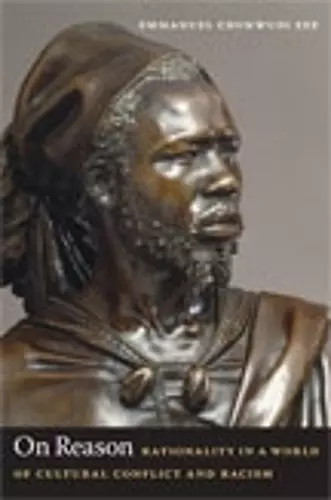On Reason
Rationality in a World of Cultural Conflict and Racism
Format:Hardback
Publisher:Duke University Press
Published:4th Jul '08
Currently unavailable, and unfortunately no date known when it will be back

Articulates a concept of reason that embraces diversity yet commands agreement across localities, cultures, and traditions and refutes the notion of reason as inherently or exclusively Western
A philosophical argument that rationality is based on, or produced from, difference, and is not only worth retaining but necessary in a culturally diverse world.Given that Enlightenment rationality developed in Europe as European nations aggressively claimed other parts of the world for their own enrichment, scholars have made rationality the subject of postcolonial critique, questioning its universality and objectivity. In On Reason, the late philosopher Emmanuel Chukwudi Eze demonstrates that rationality, and by extension philosophy, need not be renounced as manifestations or tools of Western imperialism. Examining reason in connection to the politics of difference—the cluster of issues known variously as cultural diversity, political correctness, the culture wars, and identity politics—Eze expounds a rigorous argument that reason is produced through and because of difference. In so doing, he preserves reason as a human property while at the same time showing that it cannot be thought outside the realities of cultural diversity. Advocating rationality in a multicultural world, he proposes new ways of affirming both identity and difference.
Eze draws on an extraordinary command of Western philosophical thought and a deep knowledge of African philosophy and cultural traditions. He explores models of rationality in the thought of philosophers from Aristotle, René Descartes, Francis Bacon, and Thomas Hobbes to Noam Chomsky, Richard Rorty, Hilary Putnam, and Jacques Derrida, and he considers portrayals of reason in the work of the African thinkers and novelists Chinua Achebe, Ngugi wa Thiong’o, and Wole Soyinka. Eze reflects on contemporary thought about genetics, race, and postcolonial historiography as well as on the interplay between reason and unreason in the hearings of South Africa’s Truth and Reconciliation Commission. He contends that while rationality may have a foundational formality, any understanding of its foundation and form is dynamic, always based in historical and cultural circumstances.
“[Eze’s] commitment to preserving a wide range of forms of reason, and rendering them productive of rationality, accomplishes his lifelong task of showing the ethnocentrism inherent in myopic forms of reason in Europe and Africa, and at the same time accomplishes the equally important task of showing the way to productive dialogue across the borders of forms of reason.” - Bruce B. Janz, South African Journal of Philosophy
“[On Reason] is a brilliant book, which will be read widely because Eze eloquently argues for the use of reason in philosophical discourse in world of conflict and racism. It is a welcome follow-up to Eze’s work on race and pluralism.” - Elias K. Bongmba, Africa Today
“This is not a work of sociology, but it is a work of philosophy that many will find resonates with a sociological imagination, especially one open to the impact of postcolonial thinking across the humanities and social sciences. It merits reading (and re-reading) and matching its philosophical reflections with sociological reflection on its themes. It is a thoroughly rewarding and valuable book and one which makes a significant contribution to the field.” - Gurminder K. Bhambra, The Sociological Review
“[V]aluable for all philosophy collections, and for related fields dealing with race and politics. Highly recommended.” - R.M. Stewart, Choice
“Emmanuel Chukwudi Eze has done significant work thinking critically about race, politics, history, and the discipline of philosophy. In On Reason, he makes evident the breadth and depth of African philosophy and its deep and often problematic connections to the political. The political must, as it were, be thought, and that is difficult, demanding, necessarily creative and troubling work. It is work that Eze does not shirk from, especially as a thinker deeply rooted in the cultural traditions and philosophies of Africa.”—Grant Farred, author of What’s My Name? Black Vernacular Intellectuals
“Emmanuel Chukwudi Eze takes on one of the most difficult challenges of the day: the possibility that reason, and therefore philosophy, transcends culture and history and does not simply reflect the hegemony of one culture. I like his attempts to ‘ground’ reason in experience while still maintaining reason’s authority. This is a difficult trick given our habits of thought, but he makes a plausible and important case especially to be prized by cultural theorists who want to think ‘diversity’ without having to fend off endless arguments about ‘relativism.’”—William Rasch, author of Sovereignty and Its Discontents: On the Primacy of Conflict and the Structure of the Political
“[On Reason] is a brilliant book, which will be read widely because Eze eloquently argues for the use of reason in philosophical discourse in world of conflict and racism. It is a welcome follow-up to Eze’s work on race and pluralism.” -- Elias K. Bongmba * Africa Today *
“[Eze’s] commitment to preserving a wide range of forms of reason, and rendering them productive of rationality, accomplishes his lifelong task of showing the ethnocentrism inherent in myopic forms of reason in Europe and Africa, and at the same time accomplishes the equally important task of showing the way to productive dialogue across the borders of forms of reason.” -- Bruce B. Janz * South African Journal of Philosophy *
“This is not a work of sociology, but it is a work of philosophy that many will find resonates with a sociological imagination, especially one open to the impact of postcolonial thinking across the humanities and social sciences. It merits reading (and re-reading) and matching its philosophical reflections with sociological reflection on its themes. It is a thoroughly rewarding and valuable book and one which makes a significant contribution to the field.” -- Gurminder K. Bhambra * Sociological Review *
ISBN: 9780822341789
Dimensions: unknown
Weight: 708g
352 pages